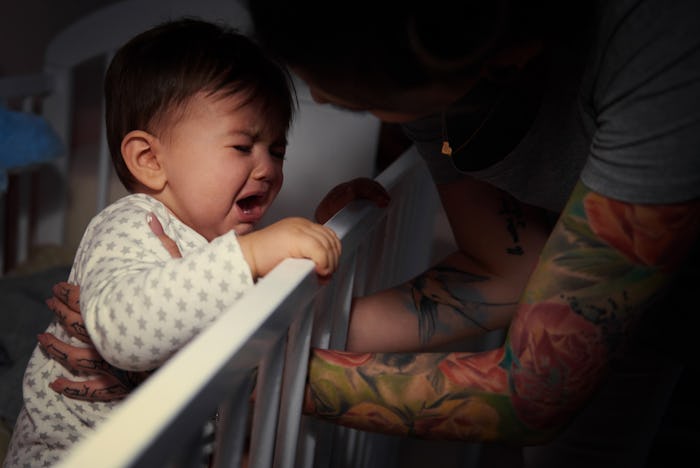Life

How Much Sleep Your Baby Needs When Crying It Out
Crying it out isn't really any parent's idea of a good time, but most of us are so sleep deprived thanks to our constantly awake bundles of joy, we're willing to try anything in order to get some decent sleep. Just how much sleep, of course, is the ultimate question. So, how much sleep should your baby be getting if you're crying it out? In the end it's sort of a trick question, right? Generally, your aim would be for your baby to be getting just as much sleep when crying it out as they would otherwise, but you can use certain sleep training methods to actually increase the amount of sleep your baby (and you) enjoy each night.
If crying it out is the method you and your parenting partner (or perhaps just you) have chosen for your baby's sleep training, start with the basics in order to set yourself and your baby up for success. First, do the detective before you start in order to ensure your baby is on a good schedule during the day. You'll also want to make sure your baby is the optimal age for sleep training. According to the Baby Sleep Site, sleep training a baby younger than 4 months old isn't advised by sleep experts. After four months, "Baby has gone through the 4-month sleep regression and is starting to develop more "adult" sleep patterns," explains the site goes on to explain.
Prior to the four month mark, infants up to 3 months old should be getting between 14 to 17 hours of sleep in a 24 hour period, according to the National Sleep Foundation. At 4 months, however, and according to Parents.com, a baby can go eight hours a night without a feeding and, by 5 months, can sleep for 10 or 11 hours straight. This is when sleep training, like crying it out, can come into play. According to the Baby Sleep Site experts, you want to watch for sleep cues so that you can help your baby fall asleep at the optimal time. You also want to make sure your baby isn't overtired, if possible, because an overtired baby will likely cry more when going down to sleep.
Creating a sleep routine for your baby will also help them get used to the pattern of going to sleep each night, while simultaneously allowing for several nights, or even a week, for your baby to get used to the sleep routine. According to the American Academy of Pediatrics, studies have shown that certain sleep training methods, like the "controlled comforting" and "camping out" methods, even improve infant sleep and reduce maternal depression in the short term. n other words, if you set up a schedule and begin sleep training at the optimal time, you might be even to increase the amount of sleep your baby receives each night.
When we were sleep training my daughter, we used the same script each time we went into her room to soothe her during the gradual extinction. We reminded her that she was safe and that we were in the next room, and that a good night's sleep was important for her to be able to have the energy to play again the next day.
In all, you and your baby most likely won't be getting as much sleep as normal during the first week of sleep training. The first few days, in fact, might be rough, according to Baby Center. The idea, though, is that your baby will begin to get more used to being in their crib alone and falling asleep by themselves, meaning that if they wake in the night they won't need you to fall back asleep.
Make a solid plan, be consistent, take lots of deep breaths and hopefully, within a week or so, everyone in your home will be getting more peaceful sleep.